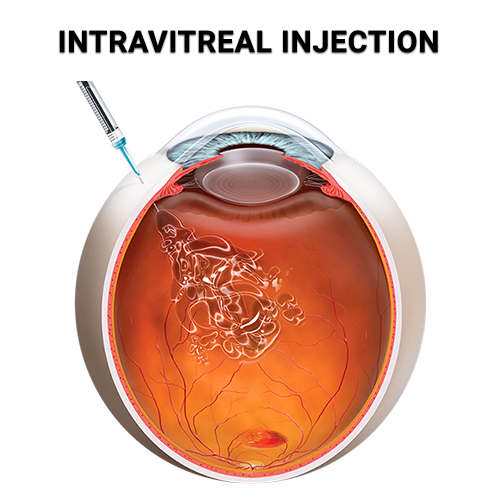 (212) 861-9797
(212) 861-9797
 (212) 861-9797
(212) 861-9797
You’re in the best hands when you visit the experienced ophthalmologists at Vitreous Retina Macula Consultants of New York. You can trust these internationally respected eye specialists whether you need an annual checkup or an injection in your eye to treat conditions that interrupt your vision. While the procedure may sound scary, the staff and physicians at this highly respected eye care practice make sure you’re comfortable and secure when you undergo treatments. Call to make an appointment to see if you’re a good candidate for intravitreal injections to relieve your suffering.
An intravitreal injection is a procedure used to deliver medication into the vitreous cavity of your eye, which contains a gel-like substance. The medication delivered through the procedure treats specific eye conditions to correct your vision. Advances in medical technologies have improved the success rates for treatments like these.

Eye injections are among the most effective treatments for a wide range of eye problems. A top-rated retina specialist chooses the best quadrant of your eye for easy access during the injection. Local anesthesia is used to ease any discomfort during the procedure.
Eye injections are among the many in-office procedures performed by the renowned retina doctors at Vitreous Retina Macula Consultants of New York (VRMNY), the center for ophthalmology. At their state-of-the-art facilities in Manhattan, Westchester and Brooklyn, experienced ophthalmologists perform the intravitreal injection procedure and other advanced eye treatments.
Dr. Freundt is a dedicated, compassionate doctor who goes above and beyond. Great medical office, wonderful and warm experience from start to finish. I am grateful to be under their care.
Depending on your health and your doctor’s evaluation, medications used in intravitreal injections may include:
Your eye doctor at VRMNY discusses every step in the procedure with you beforehand. The eye doctors at the largest, most ell-established eye practice in New York listen to your concerns and explain the benefits of the procedure.
Intravitreal injection has emerged as the most effective way to deliver medication to the complex internal components of your eye. Eye diseases treated by intravitreal injections include:
Retinal conditions caused by fluid leakage respond well to these injections. Other conditions caused by new blood vessel growth may also benefit from injections. Your eye specialist at VRMNY determines whether to administer the injection after a thorough examination of your eye and a review of your medical history.
Your trained ophthalmologist uses different drugs for intravitreal injection, based on your eye diagnosis. Common intravitreal injection treatments include:
At VRMNY, you go through an elaborate diagnostic procedure that relies on advanced diagnostic imaging to correctly diagnose your eye problem. Only then does your eye doctor develop the most effective treatment plan.
The intravitreal injection procedure is an outpatient, in-office eye procedure. The steps involved in the intravitreal injection include:
This advanced eye treatment has minimal risks. While you may feel like your eyes are drier than normal, making them tear up more often for a few days, you can return to your normal activities as soon as you’re comfortable. Your eye doctor schedules a follow up appointment and may repeat the eye injection to treat the condition fully.
Eye injections are highly effective for treating various eye diseases. Contact the top eye specialist at VRMNY today for intravitreal injections and other leading-edge eye treatments.
Let us help you enjoy your life
Call: (212) 861-9797To Speak With An Appointment Coordinator Now